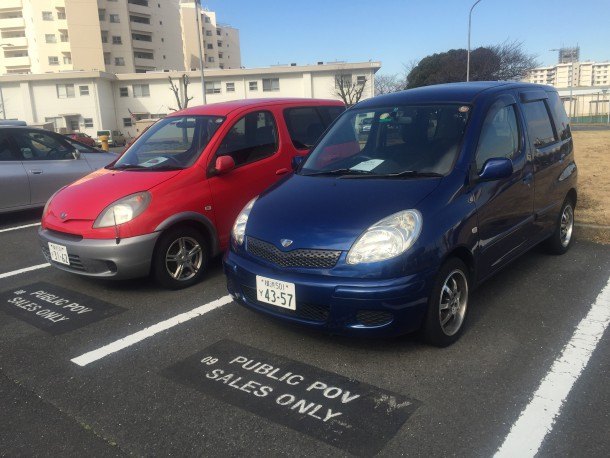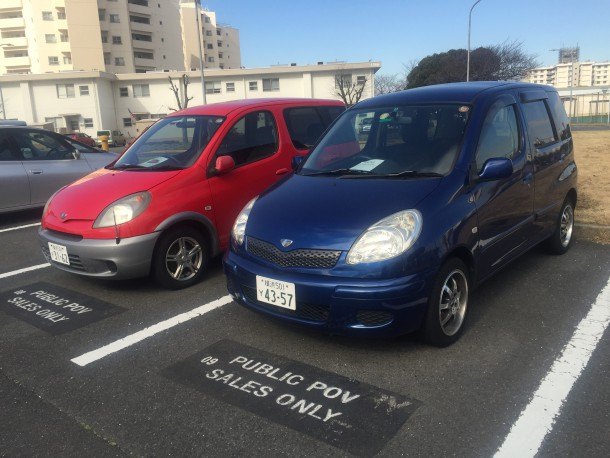Lemon or Lemonade?: A Visit to Yokosuka's Vehicle Resale Lot
I had the opportunity this week to visit United States Fleet Activities Yokosuka, a U.S. Navy base in Yokosuka, Japan originally established in 1866 by the Japanese Imperial Navy. The facilities are currently used to support and repair U.S. naval vessels assigned to the Western Pacific. On the day of my visit, there was a lot of activity and several warships along the waterfront, but I wasn’t there to enlist.
Instead, my motivation for visiting was much more mundane. I was there to eat tacos and check out the hoopties on the base lemon lot.
Officially known as Vehicle Resale Lots, lemon lots are the result of the relatively short assignment cycles endured by foreign-soil-posted military personnel. Most overseas tours last just two to three years for seamen and, because shipping and converting a vehicle to meet local regulations can be prohibitively expensive, many of them choose to buy local.
The system is simple: sailors fly in, hit the lemon lot for a cheap road-legal car, use it for a while, then put it back on the vehicle resale lot at the end of their assignment. Rinse, wash, repeat.
Cars found on lemon lots tend to be older and well worn due to their nearly constant turnover and virtually disposable nature. Bumps and scrapes are common, and it can be safely assumed only the most necessary of maintenance is performed. To be sure, purchasing one of these vehicles is a risk, but the cars make up for their failings by being cheap and, if one looks hard enough, possibility a diamond in the rough.
To my surprise, the cars on Yokosuka’s lemon lot were neither the rolling death-traps nor raging bargains I’d expected. I reckon there are a couple of reasons for this.
The first: our nation’s Navy — in what’s undoubtedly an effort to limit the number of incidents and accidents in the Land of the Rising Sun — prohibits lowest ranking, unmarried personnel from driving. Their absence from the marketplace has an obvious impact on what’s offered for sale.
The other reason: Shaken, or the fear of it, sends many borderline vehicles to the recyclers lest the repair fees prove too steep.
The result of those conditions was that most of what I found was relatively benign and in surprisingly good shape. As expected, everything on Yokosuka’s lemon lot was pure JDM and I thought I would begin by focusing on a vehicle we never got stateside, the Toyota Fun Cargo. There were two examples on the lot and, as luck would have it, they were parked next to one another.
Based on the Toyota Yaris — known as the Vitz here in Japan — the Fun Cargo was a small people mover produced between 2000 and 2004. Offered with a choice of 1.3- and 1.5-liter engines, they were sold on style rather than power, and advertisements tended to be fun and light. It’s my opinion that, with their array of bright colors and funky but simply designed interiors, they were intended to appeal to women, a good marketing strategy that often pays big dividends in Japan where women tend to control the household purse strings.
A search of my favorite Japanese used car website shows 217 Fun Cargos currently for sale nationwide. The most expensive of these cars is a well optioned, 1.5-liter wheelchair conversion unit that mounts a rear ramp and comes with a new, two-year Shaken on sale for 947,000 yen (around $8,100 USD). At the opposite end of the scale is a 1.3 liter model with a Shaken set to expire in May for just 150000 yen (around $1,280 USD).
The cars I saw at the lemon lot were 2002 and 2003 models respectively and unfortunately neither gave any indication of the CCs under their hoods. Both appeared to have automatic transmissions and were generally in decent shape. The red car shows 65,000 km on the clock and a Shaken good until February 2017. Although it was originally stickered at $3,200, its price has been recently reduced to $2,800. The blue car has 83,200 kilometers on its odometer and is advertised at $2,600. Its ad says that its Shaken is good through December of 2017 year and that it comes with two additional sets of wheels and tires.
I am not in the market for another car at the moment, so the idea of a purchase is pure fantasy on my part. Still, from where I sit, the Fun Cargo would be a good choice for a second vehicle. Do others feel the same? I’m interested in hearing why or why not.
More by Thomas Kreutzer
Latest Car Reviews
Read moreLatest Product Reviews
Read moreRecent Comments
- MaintenanceCosts What is the actual out-the-door price? Is it lower or higher than that of a G580?
- ToolGuy Supercharger > Turbocharger. (Who said this? Me, because it is the Truth.)I have been thinking of obtaining a newer truck to save on fuel expenses, so this one might be perfect.
- Zerofoo Calling Fisker a "small automaker" is a stretch. Fisker designed the car - Magna actually builds the thing.It would be more accurate to call Fisker a design house.
- ToolGuy Real estate, like cars: One of the keys (and fairly easy to do) is to know which purchase NOT to make. Let's see: 0.43 acre lot within shouting distance of $3-4 million homes. You paid $21.8M in 2021, but want me to pay $35M now? No, thank you. (The buyer who got it for $8.5M in 2020, different story, maybe possibly.) [Property taxes plus insurance equals $35K per month? I'm out right there lol.] Point being, you can do better for that money. (At least the schools are good? Nope lol.)If I bought a car company, I would want to buy Honda. Because other automakers have to get up and go to work to make things happen, but Honda can just nap away because they have the Power of Dreams working for them. They can just rest easy and coast to greatness. Shhhh don't wake them. Also don't alert their customers lol.
- Kwik_Shift_Pro4X Much nicer vehicles to choose from for those coins.









































Comments
Join the conversation
Tom, hope things improve soon. Expat living can really suck. Hang in there.
I was in the Air Force & am all too familiar with the "lemon lots". I was never stationed in Japan but did do some overseas assignments overseas & yeah, it was no big deal to just buy something cheap on the lemon lot, use it, sell it for something else, move on. I'm not sure if this is a problem in Japan but on many military bases abandoned vehicles are another big issue. If military members can't sell their car, or if the cars have too many problems they'll either give them away or simply abandon them with or without the keys in them. Eventually they'll be discovered or considered abandoned & auctioned off or junked if they're in really bad shape. When I was stationed in Hawaii, I knew a guy who had a '95 Corsica & a super low-mileage '58 Impala. When he got orders & was reassigned to San Antonio, TX he of course shipped the Impala to Texas with him(if stationed anywhere besides Japan, the US Government will ship 1 vehicle per military member free of charge). Meanwhile, he had no luck selling or even giving away the Corsica (even young, broke military members didn't want to be seen driving such a car!)so when he left it in a parking lot where it sat under a tree for 9 months. Keys & all. eventually it got so full of sap that people noticed it was there way too long & got corralled with other abandoned cars for auction.